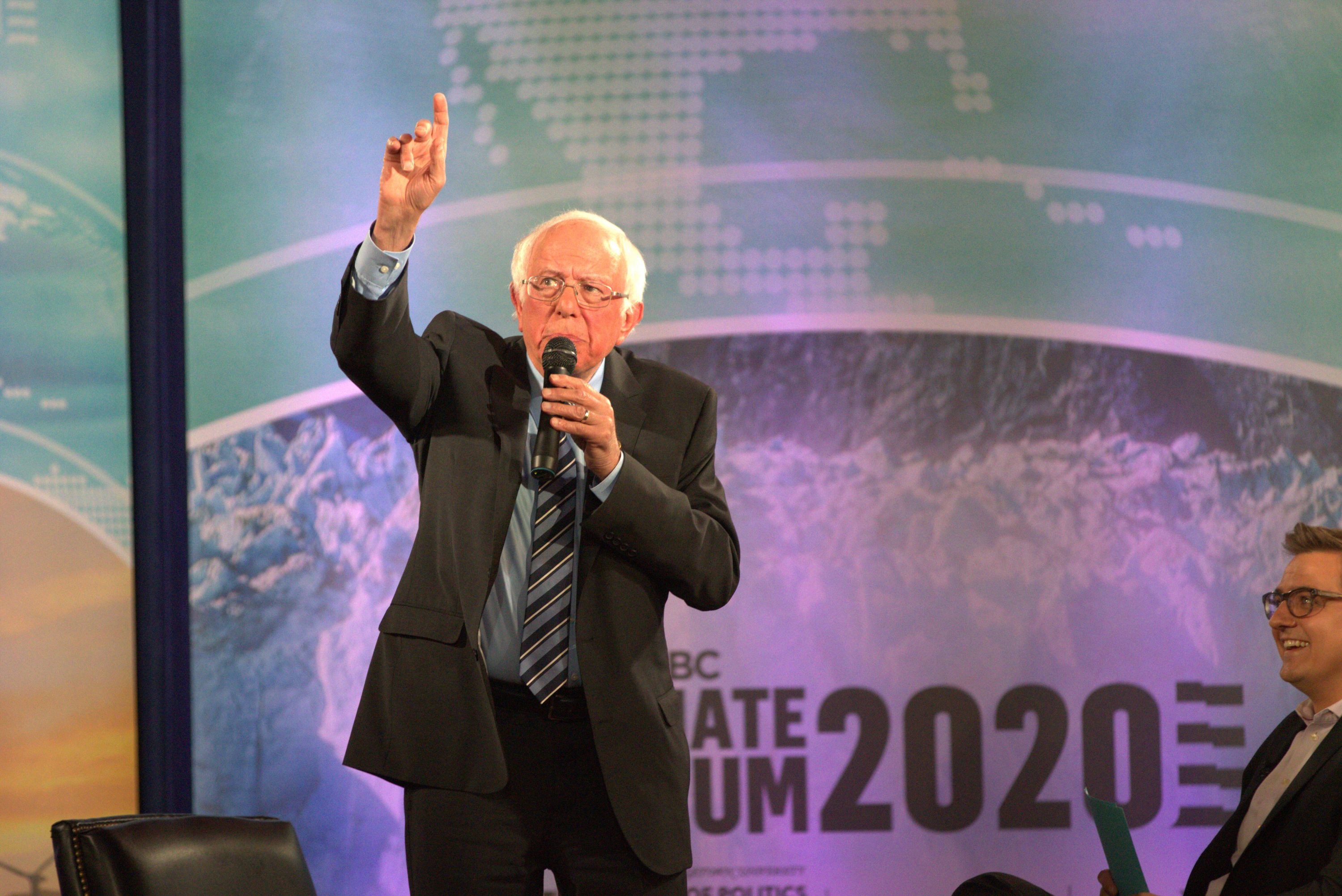“You don’t have 90 seconds to make your point and then 30 seconds to rebut what someone said about you,” said Mo Elleithee, founder and executive director of the Georgetown Institute of Politics and Public Service, of the institute’s Climate Forum 2020. “You have an actual, real conversation.”
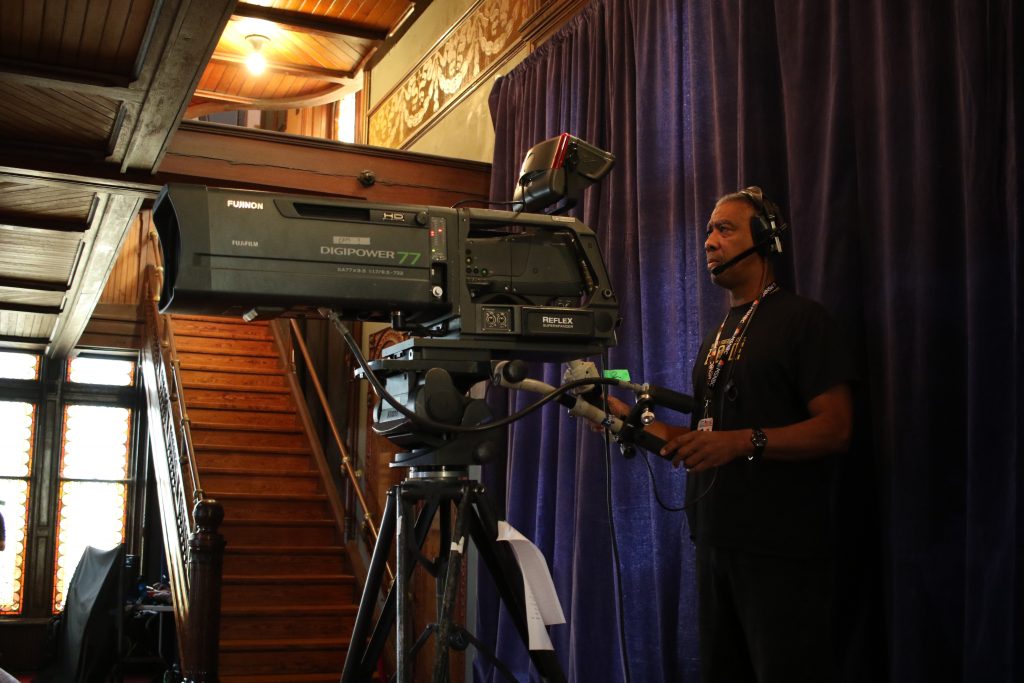
A cameraman at the Climate Forum.
On Sept. 19 and 20, 12 presidential candidates made their way to Georgetown to have those substantive conversations about climate change. Each candidate took the Gaston Hall stage for an hour to discuss their climate platforms and answer questions from students. The event’s structure allowed candidates to fully illustrate their platforms, without being muddled by debate attack strategies.
The event was cosponsored by Our Daily Planet, an independent environmental newsletter, and New York Magazine, while MSNBC was the major media backer.
With primary voting only five months away, candidates might prefer to be shaking hands and knocking doors in battleground states. “Presidential candidates don’t want to be in D.C.,” Elleithee said.
For Elleithee, simply showing up means the candidates take this issue seriously. “Having worked on many campaigns I know the demands on the candidates’ time are real,” Elleithee said. “I think it says something about those who in the fall, when the campaign is really starting to heat up, are taking an hour—half a day—out of their time when they could be in Iowa or New Hampshire to come and have this important conversation with a national audience.”
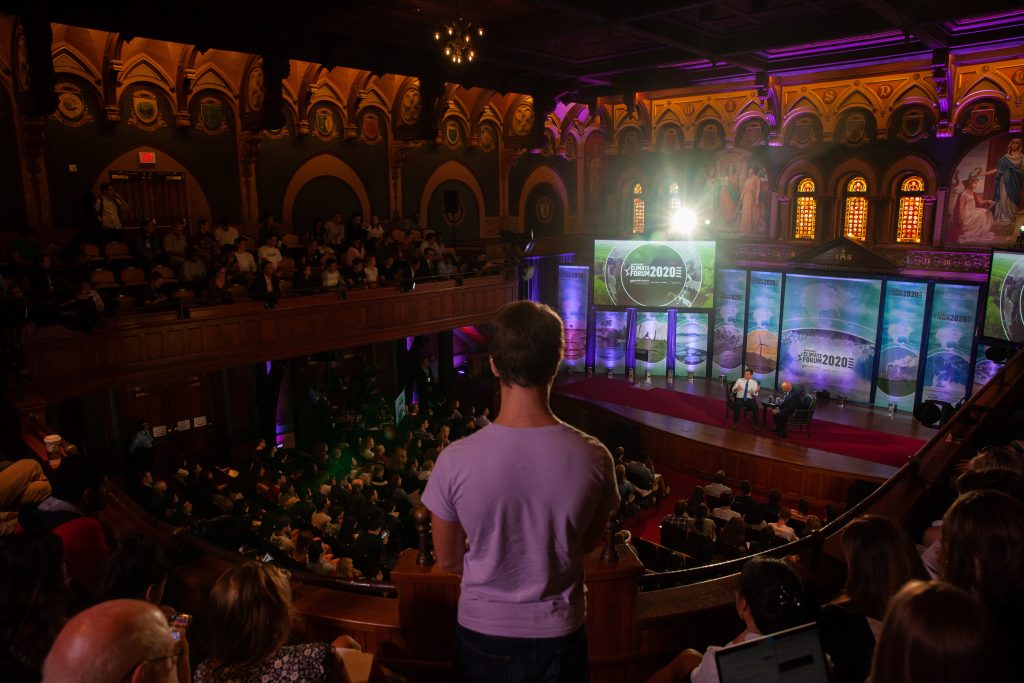
A student poses a question to candidate Pete Buttigieg.
The first day opened with Sen. Michael Bennet, followed by Andrew Yang, Marianne Williamson, Sen. Bernie Sanders, former Rep. John Delaney, Rep. Tim Ryan, and former Secretary of Housing and Urban Development Julián Castro. The second day featured five candidates: Sen. Cory Booker, Gov. Steve Bullock, Mayor Pete Buttigieg, Tom Steyer, and former Gov. Bill Weld.
Several of the leaders in the Democratic race spent their time on the campaign trail rather than attending the forum, including Sen. Elizabeth Warren, Sen. Amy Klobuchar, former Rep. Beto O’Rourke, former Vice President Joe Biden, Rep. Tulsi Gabbard, and Sen. Kamala Harris.
MSNBC anchors Chris Hayes and Ali Velshi moderated the event, leading the first half hour of discussion with each candidate before facilitating questions from students. Elleithee felt the event would be beneficial for both candidates and students—especially given the forum’s focus on climate change, which young people increasingly cite as one of the most important political issues.
In a recent poll conducted by The Washington Post, 61 percent of teenagers reported that climate change was very or extremely important, and 86 percent said they believe human activity is causing climate change. More than half said they were angry and afraid. A CBS News poll found that more than any other age group, young people think climate change is a serious problem, and 72 percent think they have a personal responsibility to do something about it.
Our Daily Planet and the Institute of Politics initially announced their partnership in June. Monica Medina (COL ’83), one of the founders of Our Daily Planet, is an adjunct professor at Georgetown, teaching Science, Technology, and International Affairs.
Soon after, MSNBC joined the project. The Institute of Politics and MSNBC had been looking to collaborate for some time, Elleithee said, and when the idea for the climate forum was proposed, they jumped at the chance. “The general agreement to do it was almost instantaneous, but then you gotta work out logistics and stuff, which took a couple weeks.”
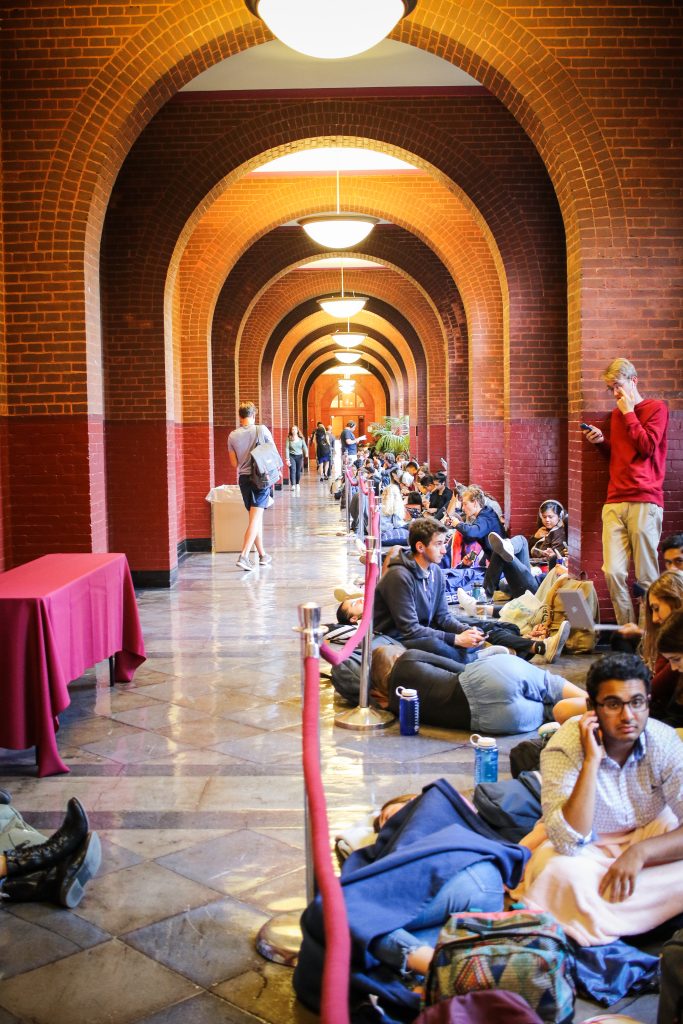
Students line up before the climate forum.
While Gaston was mostly packed with Georgetown students, they were far from the only attendees. Several students from other D.C. universities took part in the forum, including those from Howard University, American University, the University of the District of Columbia, George Washington University, and other local schools. Iowa State University, the University of New Hampshire, and the University of Southern California also hosted watch parties, where students asked the candidates questions through a live video link.
“The whole mission of the Institute of Politics and Public Service is to pull back the curtain and give students direct access to the political process through the people who do it,” Elleithee said. “That’s the whole reason we exist.”
Grace Shevchenko (SFS ’22), who attended both Sanders’s and Williamson’s segments, took advantage of the event’s convenient location. While she enjoyed hearing from the candidates, she wishes that more big names were present.
“In my opinion, I don’t think that anyone who showed up has a shot at actually being president. So it was great to hear from them and their plans, but it was less impactful knowing that they only have 2 percent of the Democratic popular vote,” Shevchenko said. Recent Real Clear Politics polling averages paint a bleak picture for the candidates that did attend. Buttigieg polls at 6.0 percent, Yang at 3.6 percent, Booker at 2.6 percent, Castro at 1.3 percent, Bennet at 0.8 percent, and Steyer at 0.7 percent of registered voters.
Specifically, Shevchenko had hoped to hear from Biden, as he brings experience as vice president and is a more centrist perspective than some of the other Democratic candidates.
Despite the absence of key front runners, Elleithee is proud that the forum drew the majority of the Democratic field to participate. In 2015, the founding year of the Institute, only Sanders spoke on campus. “I’m thrilled. When we first started this, I didn’t know if anyone would say yes,” Elleithee said. “The chance to engage with political leaders and to have a real conversation with them on an important issue—that’s why we’re here.”
The event’s format was intentionally designed as a series of conversations because the Democratic National Committee (DNC) has the exclusive right to host candidate debates. No other organization can hold a policy-based discussion that involves two or more candidates speaking at the same time. Additionally, single issue debates are not allowed under DNC rules. With this in mind, Elleithee wanted to develop the climate change discussion in a more in-depth and thoughtful capacity within the restrictions implemented by the DNC.
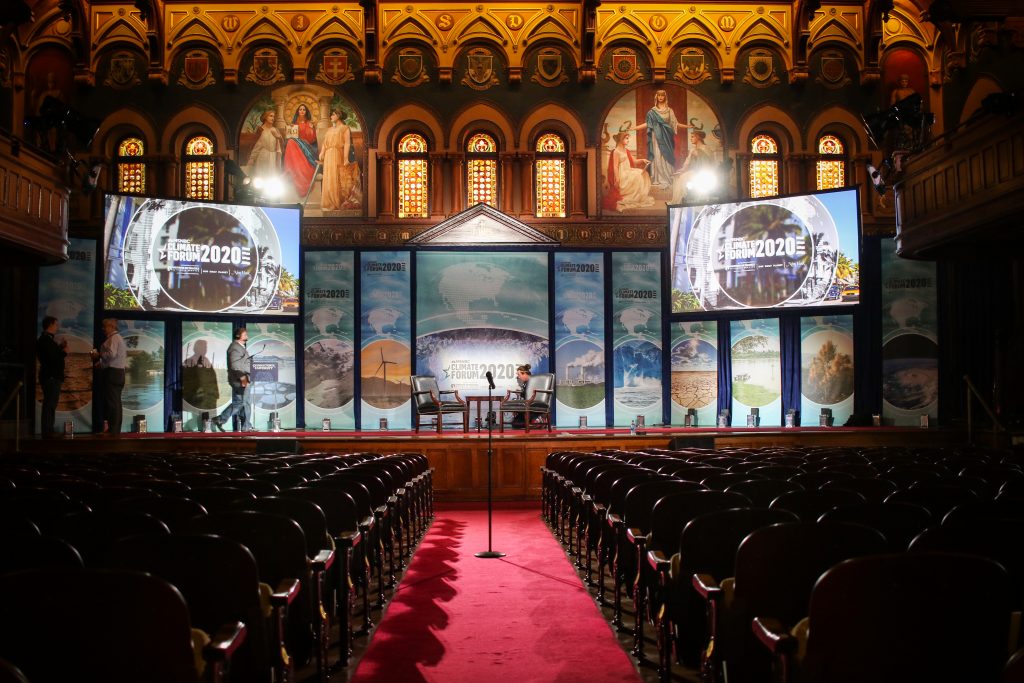
The stage in Gaston Hall ahead of the Climate Forum.
“The problem with these debates is each candidate gets a couple of minutes to answer a couple of questions,” he said. “The issues don’t really get the kind of focus that they deserve.”
In hosting this event, the Institute of Politics wanted to pave the way for discourse about climate change
“To put all that together, and do a town hall style event for broadcast in front of an entirely student audience on an issue that is so critical to young voters,” Elleithee said. “To me that’s kind of a no brainer.”
The second day of the forum fittingly took place during the Global Climate Strike; young people in D.C. and around the world took to the streets in protest of legislative inaction as world leaders prepared for the United Nations Climate Action Summit.
At the beginning of Buttigieg’s hour, video of strikers in Boston streamed on the two large screens on the stage. When Velshi pointed out the video, Buttigieg responded with an emphatic “Good!” The room, full for the first time that day, erupted in applause.
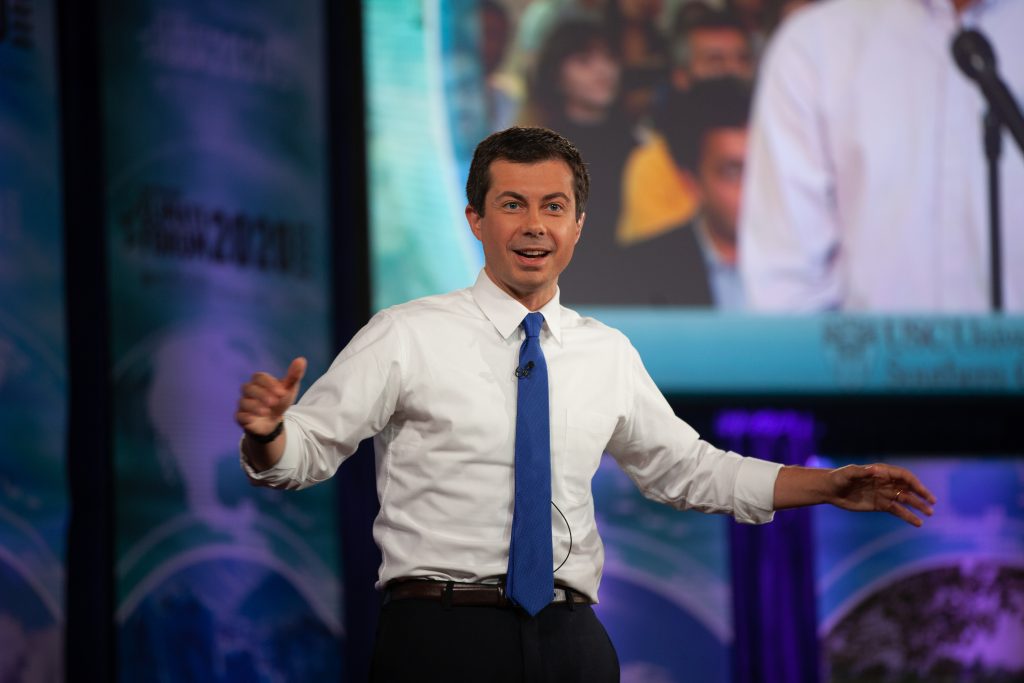
Pete Buttigieg addresses students at the Climate Forum.
“Climate is a moral issue. This is about stewardship—this is about justice,” Buttigieg said. “There’s a moment here where we should invite those who are motivated by religious, moral considerations to know that those are some of the things that are at stake.”
Sanders, who also drew a big crowd, said that this is a high stakes issue. “We’re playing for the future of the planet,” he said. He promised that not only would he be commander-in-chief, but he would be organizer-in-chief, too. “I will be in West Virginia rallying the people of that state, the people of Kentucky, the people of states all over this country, making clear to their elected officials that the time is now to save the planet and to transform our energy system away from fossil fuels,” Sanders said.
At the same time, students took the opportunity to push back on candidates’ platforms and records. Yang, whose campaign has promised a monthly $1,000 “freedom dividend” for every adult, was asked by a student from Myrtle Beach, South Carolina, what he would do to address climate change’s impact on coastal communities, saying “money can’t buy hope.” Yang explained his plans to create a fund to help homeowners in flood-prone areas and provide them with resources to relocate, if they so choose.
“We should not be pitching to people, ‘hey, you’ve got to move.’ That’s not a winner,” Yang said. “But if someone is open to it, then we should have the incentives there for them to do so.”
Castro was similarly questioned on his history of support for fracking, a form of gas and oil extraction that can lead to water pollution and increase the risk of earthquakes, in Texas. Castro admitted that while this was true during his tenure as mayor of San Antonio, he has since learned more about some of its consequences and has changed his position on the issue.
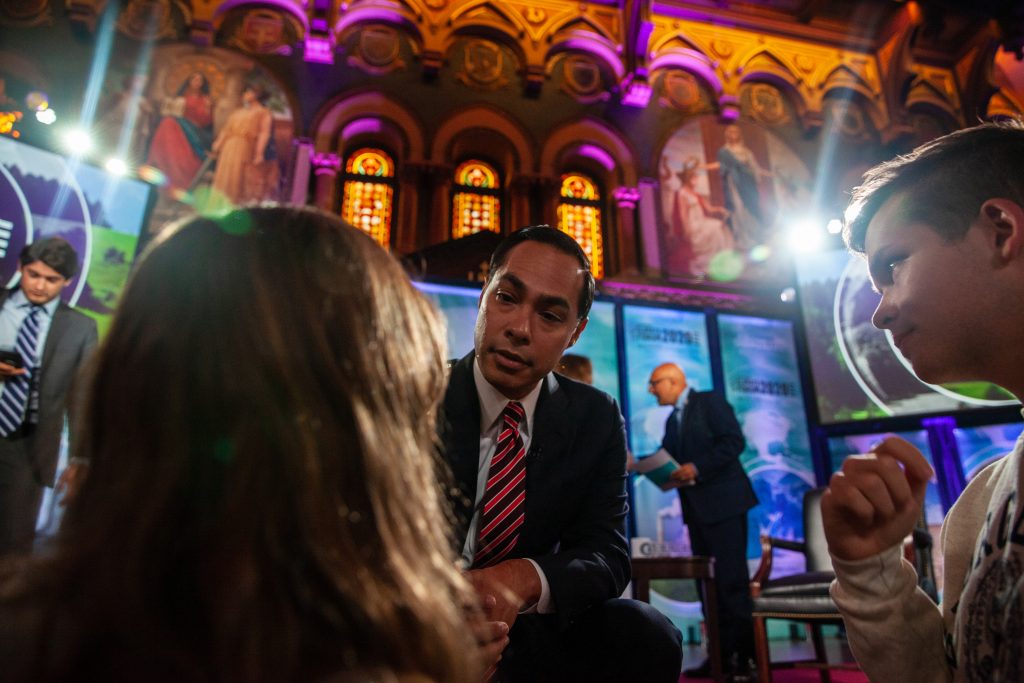
Julián Castro speaks with a student.
“A lot of us have seen natural gas as a bridge fuel, and we’re coming to the end of the bridge,” Castro said. “I support ending fracking, starting with public lands, and then phasing it out as we can.”
The first visible sign of the event was the television trucks arriving in front of Healy Hall on Wednesday. “Georgetown is no novice when it comes to bringing in big events, so everyone kinda knew what to do. This one was a little more complicated,” Elleithee said. “Everyone from GUPD to the Office of Protocols has been a tremendous partner.”
Just before the event started on Thursday, however, GUPD arrested Kurt Bardella, a political pundit and strategist married to Miroslava Korenha, one of the founders of Our Daily Planet.
According to the Metropolitan Police Department’s report, a GUPD officer attempted to prevent Bardella from going up the stairs to Gaston. Bardella then “slapped” the officer’s arms and proceeded up the stairs, where he was informed he was under arrest. The report details that Bardella “resisted being handcuffed.” It adds that multiple GUPD officers assisted in getting Bardella “to a prone position,” where he was handcuffed.
In a series of tweets, Bardella recounts his version of the interaction. “Apparently—the officer claims I ‘slapped’ his arm. That is a lie,” he wrote. Bardella included photos of injuries that he allegedly sustained during his arrest. He declined to comment on what, if any, steps he will take in the future with regard to the confrontation. Both the GUSA Executive and Georgetown United Against Police Aggression released statements in solidarity with Bardella.
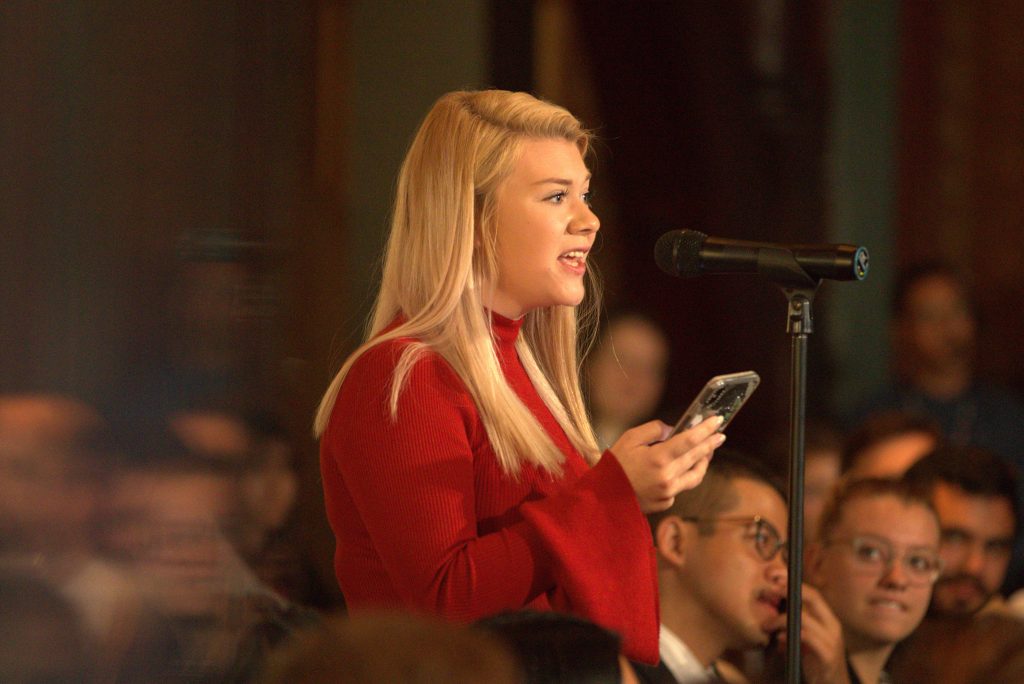
A student poses a question from the audience in Gaston Hall.
Disruptions continued over the course of the forum. On Sept. 19, the Georgetown University College Republicans (GUCR) hosted conservative guests for their “Climate Forum Rebuttal.”
Before the event, Elleithee said this decision was “fantastic” for the discourse surrounding such a prominent subject for young people. “We don’t see it as a counter event; we see it as part of the conversation,” he said. “We are all about having real conversation between people of different perspectives to help facilitate understanding of one another. You don’t have to agree, but if you can understand where they are coming from, maybe then that gets us closer to finding commonality.”
Not all students agreed with Elleithee. During the GUCR event, which featured some climate change skeptics, protesters interrupted the speakers, causing GUPD to warn students of potential Student Conduct violations. Protestors carried signs and played music during the guests’ presentations, and one wore a clown costume. Representatives from GUCR did not respond to requests for comment.
Though the majority of candidates were Democrats, the forum did include Republican former Gov. Bill Weld. He said environmental issues were once a key part of his party’s agenda. “The environment was always a Republican issue,” he said, referring to conservation efforts made by President Theodore Roosevelt and clean air and water legislation enacted under President Richard Nixon. “It’s fairly recently that the party has drifted from that.”
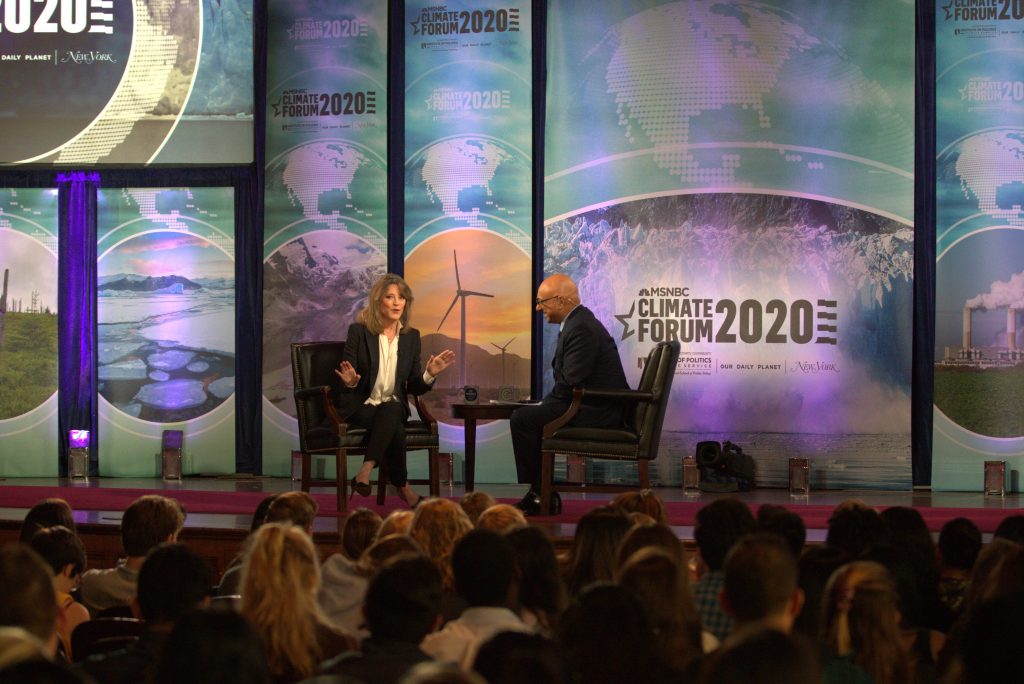
Marianne Williamson speaks to a full Gaston Hall.
Weld called on his party to abandon climate change denial rhetoric, starting with President Donald Trump, who has referred to climate change as a hoax. “To say it’s irresponsible is an understatement.”
By the end of the forum, 622 questions had been submitted from students in Gaston and at watch parties around the country, Kelly Ogburn, director of communications for the Institute of Politics, wrote in an email to the Voice. Because of the unique structure of the event, there is no accurate count of how many students attended.
Karen Kedrowski, director of the Carrie Chapman Catt Center for Women and Politics at Iowa State University, wrote in an email to the Voice that their watch event maintained a steady stream of students. “We are privileged to allow our students opportunities such as these to interact with U.S. presidential candidates,” Kedrowski wrote. “This was a unique and high-impact civic education opportunity.”
Many of the candidates took opportunities to interact with students outside of Gaston’s walls. Yang played basketball at Yates Field House, and Castro visited the Leavey Center Starbucks. Booker met Jack the Bulldog on a walk through campus, and Sanders posed for photos with flocks of supporters in front of New North.
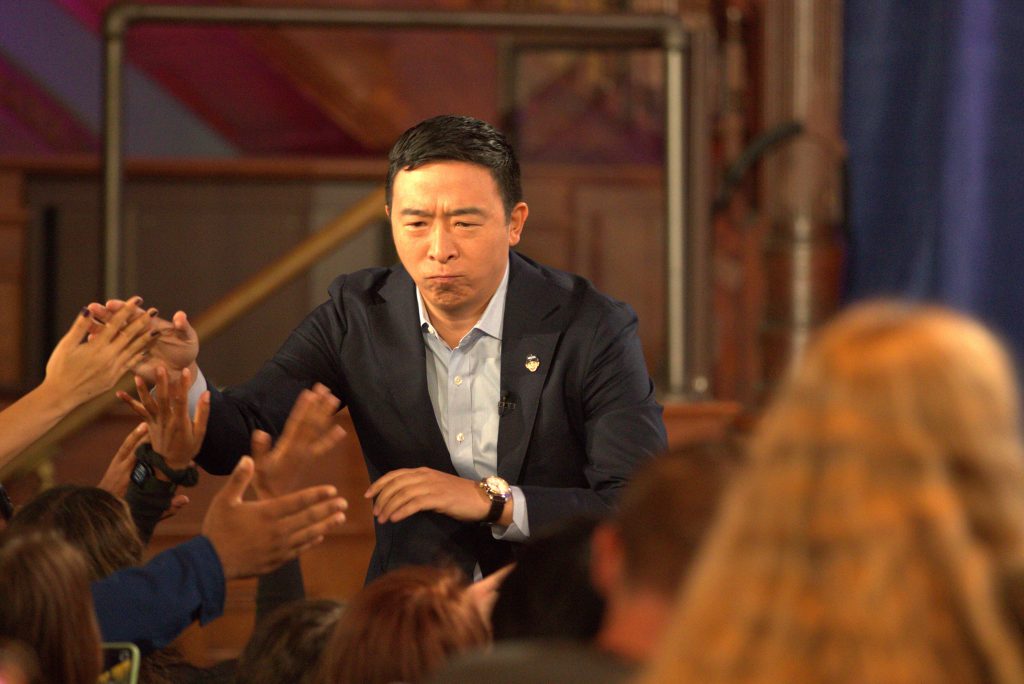
Andrew Yang greets students at the Climate Forum.
For students like Shevchenko, the fact that candidates addressed students directly signifies a cultural shift in political campaigns. “I think a lot of events in the past election and in this election are being focused on young people more specifically, whereas before candidates knew that their older voter support groups would come out,” Shevchenko said. “I think tapping into younger voters is a trend that the U.S. is going towards, and it’s exciting and hopefully it’ll mean that our generation gets involved in the government early on and stays involved.”
Katherine Randolph, Jack Townsend, Annemarie Cuccia, Sarah Watson, and John Woolley contributed to this report.


